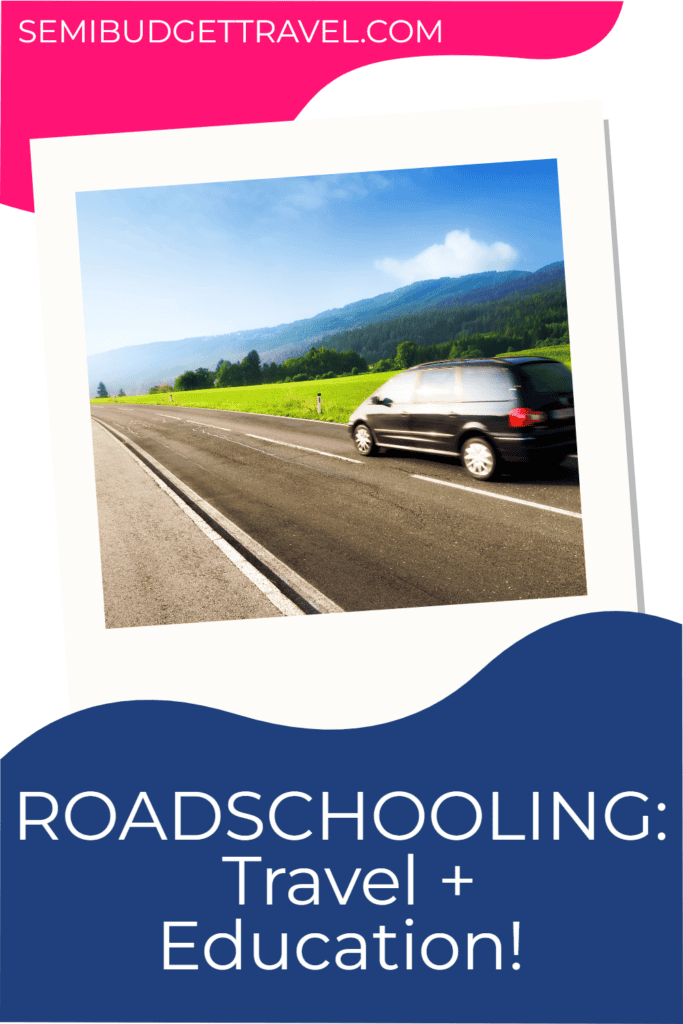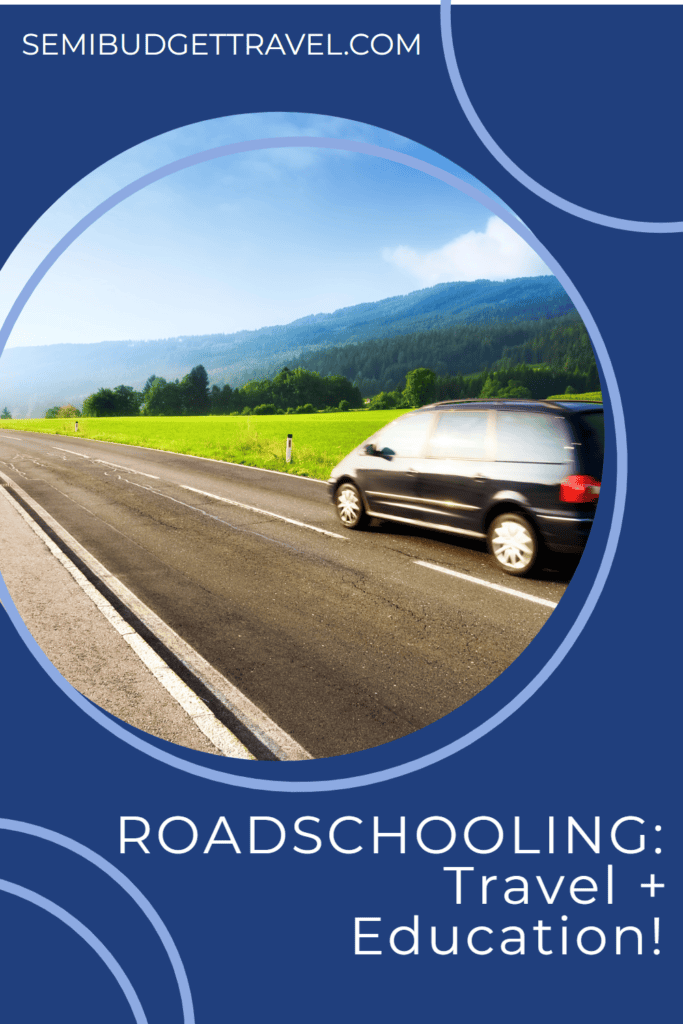Embarking on the adventure of roadschooling lets your family turn the open road into an endless classroom filled with unforgettable experiences!
Are you curious about roadschooling and how it can fit into your family’s lifestyle?
As a seasoned semi-budget traveler and travel planner, I’ve gathered a wealth of tips, tricks, and firsthand experiences to help you navigate the world of roadschooling with confidence.
Whether you’re a newbie or a seasoned homeschooler, this blog post covers everything you need to know—from managing requirements to optimizing your travel plans.
Let’s embark on this educational adventure together!
SBT Highlights
- Roadschooling combines travel and education seamlessly.
- It enriches learning through hands-on experiences.
- You can customize the curriculum to fit your family’s needs.
HI THERE! DON’T FORGET TO PIN THIS FOR LATER!

- Roadschooling
- The Roads of Education: Understanding Roadschooling
- Crafting the Ultimate Roadschooling Curriculum
- Planning Your Roadschooling Adventure
- Enrichment Beyond the Books: Extracurriculars and Field Trips
- Tips and Tricks from Our Homeschooling Travel Family
- Frequently Asked Questions
- SBT Summary: Roadschooling
Roadschooling
Traveling doesn’t mean giving up on your child’s education; it means enhancing it. Roadschooling allows you to combine learning with the adventure of travel, making every new location a classroom and every family outing a field trip.
Imagine your kids exploring geology at the Grand Canyon, studying marine biology by the ocean, or learning history in a museum rather than from a textbook.
This educational experience not only keeps your kids engaged but also strengthens family bonds through shared learning experiences.
Roadschooling goes beyond traditional homeschooling by incorporating experiential learning.
At each destination, you can tailor lessons to fit the local environment and culture, making education more relevant and exciting.
You’ll find that your children learn faster and remember more when they’re excited about their subjects.
Plus, roadschooling builds life skills that are just as valuable as academic ones, like adaptability, critical thinking, and independence.
You have a unique opportunity to craft a curriculum that fits your family’s interests and lifestyle.
With the right planning, you can blend traditional subjects like math and reading with hands-on experiences that teach practical skills.
Whether you’re exploring national parks or the local history of a small town, every stop is a chance to learn something new.
The Roads of Education: Understanding Roadschooling
Roadschooling allows you to educate your kids while traveling. It’s about blending learning with adventure, following your dreams, and ensuring your child gets a solid education.
Defining Roadschooling
Roadschooling combines traditional homeschooling with hands-on learning as you travel.
Imagine your kids learning history at historical sites or practicing math by tracking travel expenses.
Unlike traditional schooling, roadschooling uses experiences from travel to deliver a rich education.
You can still follow a structured curriculum but with flexibility.
Stay in one state for a history lesson, then move to another for a science project at a national park.
I am not an attorney, so I am not providing legal advice, but I am a long-time travel & homeschool mom. I encourage you to do your own research and come to your own conclusions as to what’s best for your family!
Legal Framework: Homeschooling Laws and Roadschooling
Navigating homeschool laws while roadschooling can be tricky.
Each home state has its own requirements.
Some states require you to register as a homeschooler; others might need you to follow a set curriculum.
Check with your home state’s Department of Education.
Some families use umbrella schools which oversee their child’s education, making it easier to comply with legal requirements.
Knowing the laws helps you plan your journey without educational hiccups.
Choosing the Right Educational Program
Choosing the right educational program is crucial.
Will you use traditional textbooks, or mix in online school courses? Maybe a private school curriculum fits best.
Customize an education plan that fits your child’s learning style.
Some families blend resources from public schools like online classes with roadschooling adventures.
Pick a homeschool curriculum that allows flexibility.
Remember, it’s about making learning fun and engaging while ensuring academic progress.
Crafting the Ultimate Roadschooling Curriculum
Creating the perfect roadschooling curriculum means blending hands-on learning with the structure of traditional subjects.
It’s about using everyday adventures and online tools to keep your kids engaged and educated.
Incorporating Real-World Experiences
Get ready to turn every stop on your journey into a classroom.
Use visits to historical sites as history lessons and dive into the unique cultures of different regions.
When you’re in a bustling city, explore local museums and parks.
Hiking in national parks? That’s a science class right there.
Your daily tasks become part of the learning experience; grocery shopping is a math lesson in disguise.
Embrace all these real-world experiences to make learning fun and engaging.
Subject Integration: From Language Arts to Social Studies
Merge traditional subjects with your adventures on the road.
For language arts, encourage your child to keep a travel journal.
This helps with writing skills and doubles as a memory vault for your roadschooling adventures.
Turn social studies into a hands-on history lesson by visiting significant landmarks.
Discuss the historical context and its impact on today’s world.
Use these trips as a springboard for discussions on geography, politics, and societal changes.
Utilizing Online Resources and Project-Based Learning
Combine your travel-based learning with online resources to ensure a well-rounded education.
Websites offer traditional curriculum materials that you can adapt to your roadschooling needs.
Lean into project-based learning to let your kids explore their passions.
Have them create presentations on different cultures they encounter or develop science experiments based on their roadschooling experiences.
This approach helps them learn deeply and retain information longer.
Planning Your Roadschooling Adventure
Embarking on a roadschooling journey requires detailed planning to ensure both educational and travel goals are met.
You’ll need to balance your destinations, schedule, and budget to make the most of this adventure.
Mapping Out Destinations: National Parks and Historic Sites
When planning your roadschooling trip, prioritize visiting national parks and historic sites.
These places provide rich educational experiences for your children and are often more affordable than traditional attractions.
Consider places like Joshua Tree, Pinnacles National Park, and historic landmarks in South Dakota.
Each site offers unique learning opportunities, from geology lessons at Joshua Tree to history lessons at local museums.
Make a list and map out your route to ensure you cover various subjects and regions (hey, even reading a paper map is a lost life skill!).
Setting the Roadschooling Schedule
Creating a flexible yet structured schedule is key.
Plan schoolwork around your travel times, and use a calendar to track daily lessons and field trips.
This helps maintain consistency and ensures you meet your education goals.
Pack necessary school materials for each child, and be prepared for days when sightseeing might take longer than expected.
Balancing Travel Costs with Learning Opportunities
Travel costs can add up quickly, so balance your budget by choosing affordable accomodations and free or low-cost educational sites.
Cooking meals instead of dining out can also save money.
Look for discounts and passes to national parks, which can significantly reduce expenses.
It’s essential to plan your finances around major stops and educational attractions.
For instance, while visiting a new place, you might splurge on a local museum but save on accommodation by staying at a more budget-friendly lodging.
Carefully managing your budget ensures you can enjoy a range of enriching experiences without breaking the bank.
Enrichment Beyond the Books: Extracurriculars and Field Trips
Roadschooling offers a unique opportunity to enrich your child’s education by weaving in local activities, engaging with nature, and encouraging relational skills.
These methods create a well-rounded, practical learning experience beyond traditional textbooks.
Harnessing Local Activities and Museums
Exploring different places enriches the learning adventure. Local activities and museums become your dynamic classrooms.
From natural history exhibits to interactive science centers, these experiences bring your favorite books and subjects to life.
You can take it a step further by visiting nearby historic sites or art galleries. This hands-on approach enhances understanding and retention of complex topics.
Volunteer in community activities to teach civic responsibility.
Whether it’s helping in a food bank or participating in a local clean-up, these extracurricular activities foster a sense of empathy and community in your child.
Engaging in Nature and Outdoor Learning
Nature serves as the ultimate classroom.
By engaging in outdoor learning, children can connect with their environment in ways that traditional schooling often overlooks.
Visit national parks, botanical gardens, or even local trails.
Outdoor activities like hiking, bird watching, and camping introduce practical life skills and promote physical health.
These experiences are invaluable and create vivid memories tied to educational themes, like biology and geology.
Natural settings provide lessons that are hard to replicate indoors.
For instance, a study about ecosystems gains depth with a trip to a wetland or forest.
Understanding is deepened with firsthand observation of wildlife and plant life in their natural habitats.
Encouraging Relational Skills and New Friendships
Roadschooling also provides ample chances for your child to meet new people and make new friends.
As you travel, take part in local group activities and sports.
Joining a local club or team can ease the transition into new communities and schools.
Working on projects with new people teaches teamwork and adaptability.
These social studies outside the classroom help children form meaningful connections and learn about diverse perspectives.
Attend local events like festivals, fairs, and farmers markets.
These gatherings are great places for building friendships and learning about new cultures and traditions.
Plus, they’re just plain fun!
Tips and Tricks from Our Homeschooling Travel Family
Roadschooling is an exciting way to combine learning with adventure. Here are some tips from our family that will help you make the most of your educational journey.
Travel Journal
Keep a travel journal.
This is a perfect opportunity for your children to document their experiences, write about the places they visit, and practice their writing skills.
Younger Children
For younger children, use games and project-based learning to make education fun and interactive.
Grade level doesn’t matter as much on the road.
Focus on your child’s interests to keep them motivated and eager to learn.
Use a coffee table book for geography and history lessons.
It’s a great way to visualize the places you’ll visit.
Shared Ideas
Involve your kids in the planning.
Create a shared family note where everyone can contribute ideas related to the destinations you’ll visit.
Sending them on research missions about the next stop is a fun way to learn.
This helps in planning and makes everyone feel included.
Discounts & Perks
Look for educational discounts and perks at museums, national parks, and other attractions.
Many offer special rates for students or homeschoolers.
You can also save by traveling in the off-season or at off-peak times.
Frequently Asked Questions
How can I balance my wanderlust with my child’s education?
Balancing travel and education isn’t as tricky as it sounds.
Roadschooling lets you teach through real-life experiences.
Turn sightseeing into history lessons, museum visits into art classes, and local food into culinary studies.
Can you share some tips for integrating local cultures into my child’s curriculum?
Dive into local cultures by visiting historical sites, attending community events, and tasting regional foods.
Use these experiences to create lessons in history, geography, and social studies.
Get your kids involved in local traditions and customs to make learning fun and immersive.
What resources are available for parents who choose to educate while traversing the globe?
There are plenty of resources to help you out.
Online curricula, educational apps, and virtual tutoring services can be incredibly useful.
What’s the secret to keeping kids engaged with their studies while on the road?
Keep your kids engaged by mixing traditional studies with hands-on learning.
Use travel days for reading or math practice.
Explore new places to make learning exciting.
Encourage your kids to journal their experiences and share what they’ve learned.
SBT Summary: Roadschooling
Incorporating education into your travel adventures makes learning a dynamic and enriching experience for the entire family!
Benefits:
- Roadschooling combines academics with hands-on experiences, making learning interactive and memorable.
- It provides the unique opportunity for children to engage with diverse cultures and communities, enhancing their global awareness.
- The flexibility of roadschooling allows for personalized and adaptable teaching methods, catering to each child’s individual learning style.
Challenges:
- Keeping up with different homeschool regulations can be a bit of a headache.
- If you use online resources, finding reliable internet on the road can be a challenge.
- Living out of a vehicle means limited space. Being organized is key to managing school supplies and living essentials.
All told, the benefits far outweigh any challenges.
With the right resources, attitude, and organization, roadschooling can be an incredible experience for both parents and kids.
It’s an adventurous and flexible educational journey that inspires lifelong learning while creating unforgettable family memories!
So pack your bags and hit the road for an educational adventure of a lifetime!
ENJOYED THIS POST? PIN IT FOR LATER!

➡️ SUBSCRIBE ⬅️
STARTS WITH
A GREAT BUDGET!

ALL GREAT SEMI-BUDGET TRAVEL
It's easy! I will show you how with a FREE trip planning tool.







